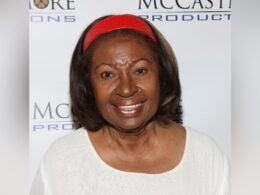Jean Smart hasn’t been on Broadway for 25 years. The last time, she played a glittering, glamorous and ruthless actress in Thornton Wilder’s “The Man Who Came to Dinner,” a powerful siren who enjoyed breaking up marriages for sport. This time, she’s an abused woman from small-town Louisiana who makes her first appearance in the toilet of a mobile home in a Louisiana trailer park.
It’s likely quite the jolt for fans of a much-awarded actress familiar for her work on “Hacks,” “Designing Women” and “Mare of Easttown,” a contrast intensified by Jamie Wax’s “Call Me Izzy” opening in the slipstream of the Tony Awards. As the Broadway glitterati was walking by outside Studio 54 over these last few nights, Smart was inside, slipping disinfectant into a bowl for her bemused fans.
“My husband, Fred, he hates the blue cleaner I put into the toilet almost as much as he hates my writin,’” Smart’s titular character says to the audience at the start of “Call Me Izzy,” as she flushes and marvels at the various shades of swirling azure.
Uh oh, you’ll surely think, right off the bat. This Izzy sounds like a working-class writer trapped in a marriage with an oafish, one-syllable southern man who won’t understand such matters as artistic freedom, artistic expression and the desire to escape said trailer park for a more examined life. The kind of scared little dude who might well resort to violence to keep his wife in line.
You would, of course, be right. That’s exactly the scenario in “Call Me Izzy,” a solo show about the power of poetry and its ability to lift working-class writers out of their difficult lives, but only if they can find room to express themselves, bat away those who would block their progress and align themselves with the kind of mentor who will take an interest.
For those of us who’ve been around a while, “Call Me Izzy” starts to recall the plot of Willy Russell’s “Shirley Valentine,” another play about the power of humanistic education, albeit set in Liverpool rather than Mansfield, La. In both plays, the lovable central character finds herself in the thrall of a charismatic teacher who clearly represents a means of escape from those with no understanding, but might also just be a distraction from what typically is venerated in plays like this, which is finding your own way with words and ideas.

Those are noble sentiments and there are only so many stories under the sun. Moreover, stories about white, working-class characters from Louisiana are as rare on Broadway as dramas about blue-collar poets; I’d venture that no toilet has ever played so prominent a role at Studio 54, at least not since that venue’s days as a nightclub.
All that is to say “Call Me Izzy” is not a total bust, especially given Smart’s formidable acting chops. Monologic shows like this with no explicit person being addressed require deeply conversational kinds of performance, as if the audience were all your best friend who just happens to be outside the bathroom door, and Smart is skilled and experienced enough to forge such a bond. I believed her entirely as a woman from small-town Louisiana capable of both great stoicism (often a feature of those in abusive relationships) and profound artistic yearning.
Her performance is somewhat under-scaled and under-vocalized for so large a Broadway house (and why are we here in so huge a space, one wonders?), but then it has been 20 years and the deeply honest Smart is clearly immersed in her character, with nary a note of condescension.

But you still always know were “Call Me Izzy” is ultimately going, even if the piece is a tad confusing as to its chronology; that’s another frequent risk with long monologues recounting a story that may have happened in the past, may still be happening, may go wrong in the future. The audience needs more signposts from a director, and heftier moment-by-moment tension, than director Sarna Lapine here provides us.
“Call Me Izzy’ is simply one character’s point of view and you can’t help contrast it with the complexity of “The Picture of Dorian Gray,” which uses one live actress to create an entire Victorian world. In the case of “Izzy,” one might as well be reading the narrative on the page.
Except of course for the chance to see Smart, which is why most people will be there. The biggest challenge she faces here is to overcome the fundamental familiarity of a moralistic script that gives us a clearly sympathetic character battling against a brute we never see and wanting us to be surprised by the outcome. Waxx is so in love with his central character, he finds it hard to give her anything truly substantial to fight against as she rolls down her personal runway. Smart does her considerable best to find it for him, but she didn’t write the play.








